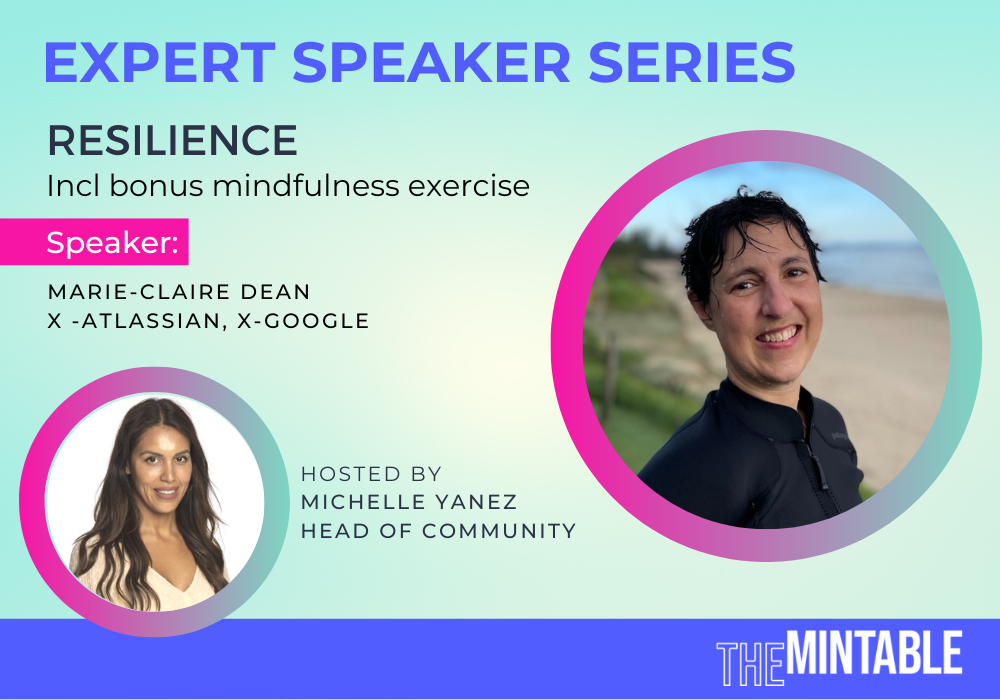
The Mintable’s Expert Speaker Series returned this month, featuring the incredible Marie-Claire (MC) Dean, Head of Product at The Mintable, who shared practical ways for managers to cultivate resilience. The series is a membership feature we offer to our community of managers. We partner with world-class speakers to deliver content that inspires, informs and educates on the topics that matter most.
Why this topic? We’ve heard from our community that many managers are navigating incredibly stressful and challenging circumstances. With so much going on it can be hard to remain focused and keep moving forward, not to mention creating time for self-care.
MC is a powerhouse, formerly at both Google and Atlassian, and has over 17 years experience as a yoga and meditation instructor. Read on for some of the tips and meditation techniques she shared to help build resilience and self-compassion, especially during times of high stress.
#1. Create the right environment to grow resilience
To sustain high performance and strong culture, thriving managers need to develop resilience. But even the best of managers can’t cultivate resilience in the wrong environment. Rather than beat yourself up for feeling unable to build resilience, consider what you can change about your environment.
Invest in a positive relationship with your manager, find ways to connect with peers (e.g. join an affinity group or community, volunteer together, plan an outing), make a comfortable working space, and carve out time for self care. Similarly, HR leaders can consider whether you are creating a workplace that gives managers the support and resources they need to blossom.
When working conditions are ripe for you to thrive, you’re paving the way for resilience and the untold treasures it can unlock.
#2. Resilience is not about being tough, it’s about having compassion
Pushing really hard, beating yourself up, holding yourself to ridiculously high standards, having a stiff upper lip. Sound familiar?
Resilience is not about being tough, hard or gnarly. These oft-celebrated behaviors can weaken us and erode resilience.
That’s why Dr. Kristin Neff, an Associate Professor in educational psychology at the University of Texas, focuses her work on self-compassion. In her book, Self-Compassion: The Proven Power of Being Kind to Yourself, she teaches how self-compassion is uniquely and intimately tied to resilience:
“Instead of mercilessly judging and criticizing yourself for various inadequacies or shortcomings, self-compassion means that you are kind and understanding when confronted with personal failings.”
Being kind to ourselves creates a foundation for resilience, though it is harder than it seems.
Self-compassion requires:
- Accepting both good and bad outcomes
- Recognizing that suffering and personal inadequacy is all part of a shared human experience
- Taking a balanced approach to our negative emotions so that those emotions aren’t suppressed, but they’re not exaggerated either
In cultivating self-compassion, managers become able to nurture themselves, and in turn, others. They don’t turn on themselves or others when confronted with hardship.
#3. Try the RAIN Framework
Rather than simply telling yourself or your managers to “be kind to yourself” – try using a practical tool to do so. MC guided our managers through a 10-minute mindfulness session and used an easy-to-follow framework called RAIN as the process to bring mindfulness to difficult emotions.
R - Recognize
Take a moment to recognize you’re stuck. Try naming the emotions you feel. Anger? Frustration? Shame? Vulnerability? Naming emotions can change your physiology. It might induce sweaty palms, tense limbs or a racing heart.
A - Allow
Instead of immediately trying to resolve the uncomfortable feelings, allow yourself to sit in the experience exactly as it is. Acknowledge and give space to exactly what arises. Allowing has the quality of simply pausing.
I - Investigate
Now it’s time to bring some nurturing compassion to what you feel. What happens if you make some gestures of kindness or understanding internally? Can you offer compassion to yourself, to soften the experience?
N - Nurture
Try to sense what the wounded, frightened or hurt place inside you needs to recover and offer it some gesture of active care. Does it need a message of reassurance? Forgiveness? Companionship? Love? Experiment? You can try a mental whisper. I’m a good manager, I’m okay. I’m a good person.
A huge thank you to Marie-Claire Dean for leading this virtual session and sharing her infinite knowledge on resilience and self-compassion.
Missed our last speaker series on Time Management with Jenna Polson? Get the recap here.
Are you an individual manager and want to see how The Mintable can give you the training, tools, and community to succeed? Learn more and join us here.
Are you a founder or HR/People leader and would like to explore how The Mintable can help the managers in your organization thrive? Get your free demo here.
Take a moment to recognize you’re stuck. Try naming the emotions you feel. Anger? Frustration? Shame? Vulnerability? Naming emotions can change your physiology. It might induce sweaty palms, tense limbs or a racing heart.